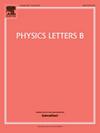引力背景下不同类型钟状态的量子转向
IF 4.5
2区 物理与天体物理
Q1 ASTRONOMY & ASTROPHYSICS
引用次数: 0
摘要
在相对论框架下,人们普遍认为最大纠缠态的量子转向在实际应用中比非最大纠缠态具有更大的优势。在本文中,我们研究了在史瓦西黑洞视界附近四种不同类型的费米子模式钟状态的量子转向。在某些参数空间中,转向不对称的峰值对应于钟态在霍金效应的影响下从双向转向单向的转变。有趣的是,最大纠缠态的费米子可操纵性随着霍金温度的升高而突然死亡,而非最大纠缠态的费米子可操纵性在无限霍金温度下保持不确定的持久性。与先前的研究相比,这一发现表明,在引力背景下处理量子任务时,非最大纠缠态的量子转向比最大纠缠态的量子转向更有利。这一惊人的结果颠覆了“相对论框架下最大纠缠导向优势”的传统观念,为理解黑洞霍金效应提供了新的视角。本文章由计算机程序翻译,如有差异,请以英文原文为准。
Quantum steering for different types of Bell-like states in gravitational background
In a relativistic framework, it is generally accepted that quantum steering of maximally entangled states provides greater advantages in practical applications compared to non-maximally entangled states. In this paper, we investigate quantum steering for four different types of Bell-like states of fermionic modes near the event horizon of a Schwarzschild black hole. In some parameter spaces, the peak of steering asymmetry corresponds to a transition from two-way to one-way steerability for Bell-like states under the influence of the Hawking effect. It is intriguing to find that the fermionic steerability of the maximally entangled states experiences sudden death with the Hawking temperature, while the fermionic steerability of the non-maximally entangled states maintains indefinite persistence at infinite Hawking temperature. In contrast to prior research, this finding suggests that quantum steering of non-maximally entangled states is more advantageous than that of maximally entangled states for processing quantum tasks in the gravitational background. This surprising result overturns the traditional idea of “the advantage of maximally entangled steering in the relativistic framework” and provides a new perspective for understanding the Hawking effect of the black hole.
求助全文
通过发布文献求助,成功后即可免费获取论文全文。
去求助
来源期刊

Physics Letters B
物理-物理:综合
CiteScore
9.10
自引率
6.80%
发文量
647
审稿时长
3 months
期刊介绍:
Physics Letters B ensures the rapid publication of important new results in particle physics, nuclear physics and cosmology. Specialized editors are responsible for contributions in experimental nuclear physics, theoretical nuclear physics, experimental high-energy physics, theoretical high-energy physics, and astrophysics.
 求助内容:
求助内容: 应助结果提醒方式:
应助结果提醒方式:


